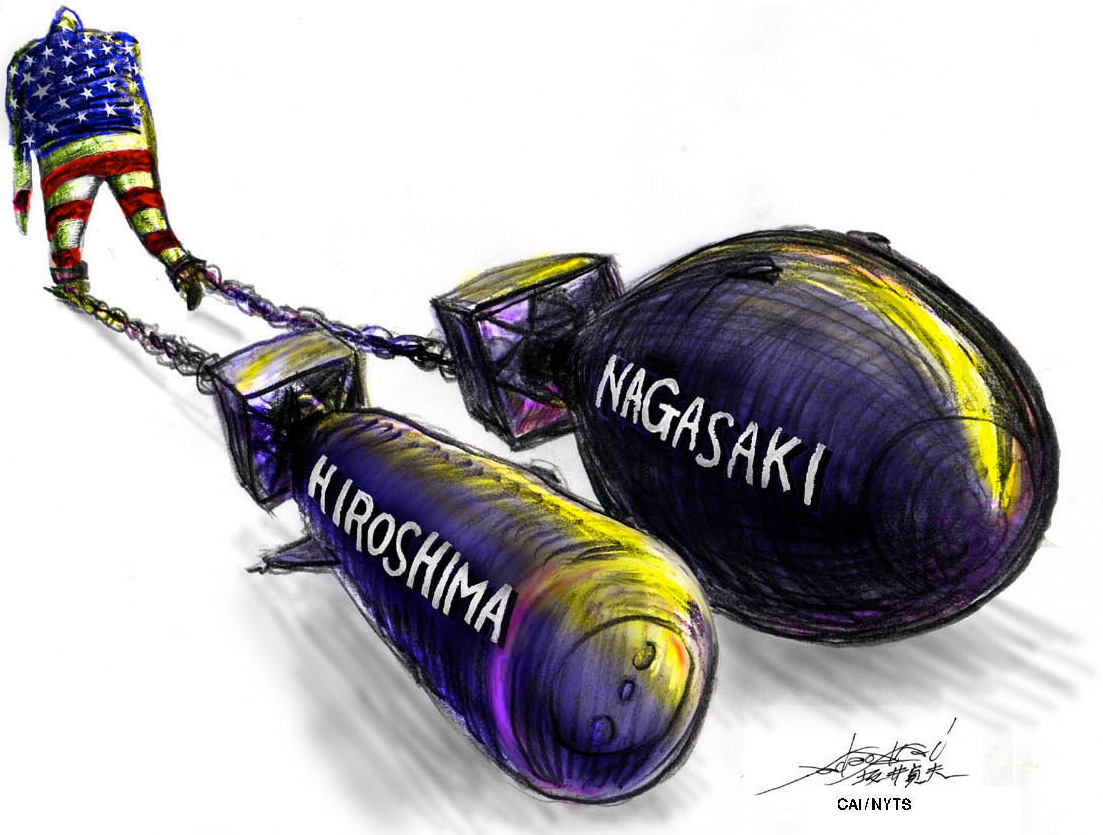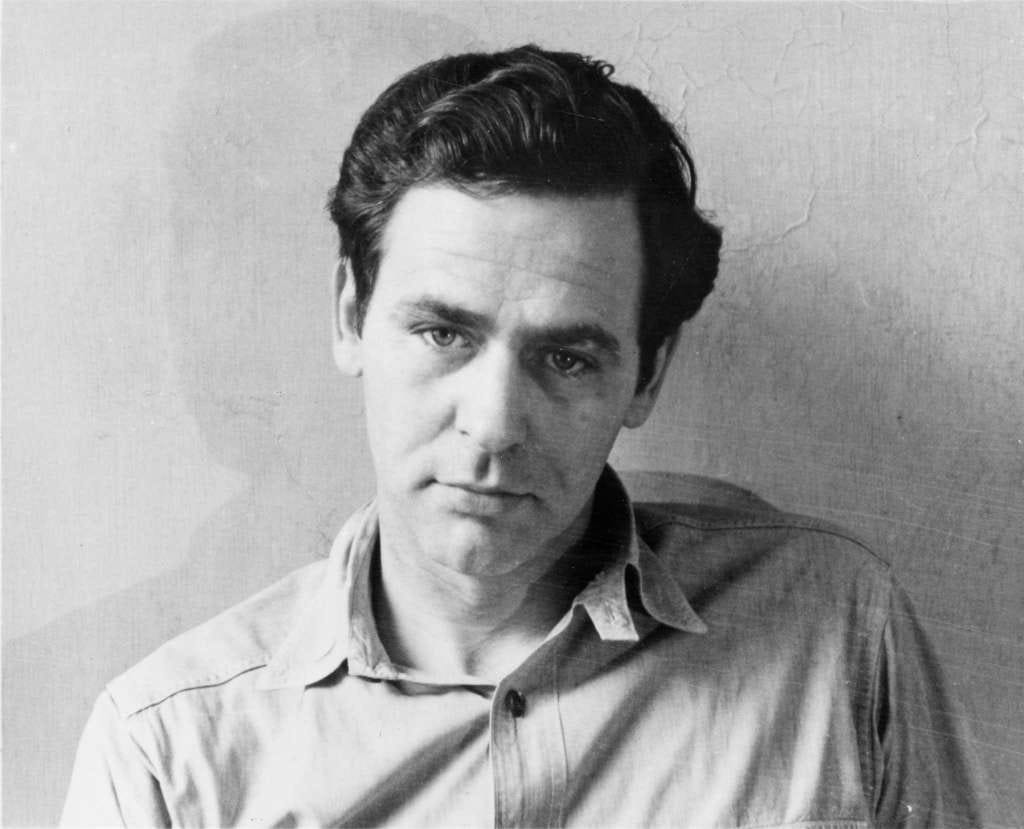Reprinted with permission from Greg Mitchell’s newsletter Oppenheimer: From Hiroshima to Hollywood.

It’s in vain to recall the past, unless it works some influence upon the present. – Charles Dickens
On this day in 1945, two days out from the attack on Hiroshima:
– On the island of Tinian, Little Boy is ready to go, awaiting word on weather. Secretary of War Stimson writes of a “troubled” day due to the uncertain weather, adding: “The S-1 operation was postponed from Friday night [August 3] until Saturday night and then again Saturday night until Sunday.”
– At 3 p.m. on Tinian, Paul Tibbets, pilot of the lead plane, the Enola Gay, briefs others in the 509th Composite Group who will take part in the mission at 3 pm. Military police seal the building. Tibbets reveals that they will drop immensely powerful bombs, but the nature of the weapons are not revealed, only that it is “something new in the history of warfare.” When weaponeer Deke Parsons says, “We think it will knock out almost everything within a three-mile radius,” the audience gasps.
Then Tibbets tries to show a film clip of the recent Trinity test – but the projector starts shredding the film. Parsons adds, “No one knows exactly what will happen when the bomb is dropped from the air,” and he distributes welder’s glasses for the men to wear. But he does not relate any warnings about radioactivity or order them not to fly through the mushroom cloud.
– On board the ship Augusta steaming home for the USA after the Potsdam meeting, President Truman relaxes and plays poker with one of the bomb drop’s biggest booster, Secretary of State Jimmy Byrnes. Truman’s order to use the bomb had simply stated that it could be used any time after August 1 so he had nothing to do but watch and wait. The order included the directive to use a second bomb, as well, without a built-in pause to gauge the results of the first and the Japanese response—even though the Japanese were expected, by Truman and others, to push surrender feelers, even without the bomb, with Russia’s entry into the war around August 10. Hence: assembly-line massacre in Nagasaki.

In the months after the twin atomic attacks on two Japanese cities, which killed upwards of 200,000 civilians, scientists, political commentators and magazine writers such as John Hersey responded in the media with warnings about a future under the mushroom cloud. Hollywood pushed forward with its first movie drama, MGM’S The Beginning or the End. The subject appeared too unsettled and complex for American novelists, however. There were no reports of any even attempting to take a crack at it.
What happened to Hiroshima and Nagasaki may have been impossible to imagine, let alone render. One recalls Whitman’s comment on the Civil War: “The real war will never get into the books.”
A writer best known for his non-fiction did take up the challenge, but even he had to do it in a shorter, satirical form. At its center was (cue the Oppenheimer echoes) was a guilt-ridden scientist.
James Agee, only thirty-five years-old but already fearing he was a has-been, had raised questions about the making and use of the bomb in the pages of his main outlet, Time magazine, where he made his name as a film critic and all-purpose scribe. (His book with photographer Walker Evans, Let Us Now Praise Famous Men, had flopped.) As an American, Agee felt personally implicated in the killing of thousands of civilians. “The race had been won,” he declared in Time, “the weapon had been used by those on whom civilization could best hope to depend; but the demonstration of power against living creatures instead of dead matter created a bottomless wound in the living conscience of the race.” Elsewhere he called the development of the bomb “the worst thing that’s ever happened – so far” and Hiroshima “the only thing much worth writing or thinking ab
His response in fiction was a bizarre fantasy called “Dedication Day.” He considered it a kind of “rough sketch” for a motion picture (he had long wanted to break into movies), but first he submitted it as a short story to Politics magazine, edited by one of the prominent critics of the decision to drop the bomb, Dwight MacDonald.
It depicted a postwar celebration of the bomb featuring a great arch, made of fused uranium, designed by Frank Lloyd Wright. General Leslie Groves, head of the bomb program for the Manhattan Project, attends and the ceremony is broadcast in the first national television hook-up. But during this event a bugler, assigned to blow “Reveille,” instead plays “Taps.”
It seems that one of the scientists who worked on the bomb has gone “a little queer in the head” and “now has a broken mind.” He is doing crazy things like consulting Quakers and poets. He insists on joining a group of badly injured survivors of “the experiments of Hiroshima and Nagasaki” who had been “forgiven” by the Americans and therefore enlisted in a key project connected to the memorial. Attendees view him in agony, crying, tearing at his hair, as he worked alongside the survivors, mockingly flashing the V for Victory sign to the tourists, who “jeer” him.
Later, out of sight, the scientist commits suicide, by poison, with a note pinned to his coat calling this “obligatory,” an ethical “sacrifice.” This, of course, somewhat marred “the intended dignity, charm and decorum” of the celebratory event.
The scientist is then buried with full honors at (wait for it)…the Trinity test site, where speakers warn that this is what happens to those who make “the grievous error of exaggerated scrupulousness.” Clergymen and philosophers embark on a campaign of “controlled ridicule.” The narrator concludes:
For misguided and altogether regrettable though his last days were – a sad warning indeed to those who turn aside from the dictates of reason, and accept human progress reluctantly – he was, nevertheless, perhaps, our last link with a not-too-distant past in which such conceptions as those of “atonement”, and “guilt,” and “individual responsibility,” still had significance. And, in a sense, his gift to mankind was greater, perhaps, than that of his more stable colleagues.
Along the way, Agee skewered every facet of American life: government, business, advertising, religion, science, psychiatry, modern art, and public opinion. Any attempt to atone for Hiroshima will be viewed as evidence of madness, he warned.
Agee hardly stopped there, however. He penned mocking reviews of that pro-bomb MGM film, The Beginning or the End, for both Time and The Nation. He remained obsessed with the subject, making plans to write a non-fiction book on the effects of the bomb. He even aimed to collaborate with Charles Chaplin – he was one of the few U.S. critics to champion his current film, Monsieur Verdoux – on a fruitless movie project, titled Scientist and Tramp, that would inject the star’s most famous character into a post-nuclear holocaust. Agee wanted the Little Tramp to roam the world asking scientists to abandon their “genius with gadgetry” and all of their lethal projects, to no avail, leaving him in the end utterly alone.
With his rare artistic and journalistic obsession with this subject, Agee must have felt much akin to Chaplin in this scenario.
Just noticed that the great and sometimes darkly humorous Atomic Cafe movie – so influential in the early days of the massive antinuclear/freeze movement starting in 1982, when I saw it – is up on YouTube for free via KinoLorber, so here it is. Not long ago it was added to the National Registry of important films.
Greg Mitchell is the author of a dozen books, including “Hiroshima in America,” and the recent award-winning The Beginning or the End: How Hollywood – and America – Learned to Stop Worrying and Love the Bomb, and has directed three documentary films since 2021, including two for PBS (plus award-winning “Atomic Cover-up”). He has written widely about the atomic bomb and atomic bombings, and their aftermath, for over forty years. He writes often at Oppenheimer: From Hiroshima to Hollywood.


